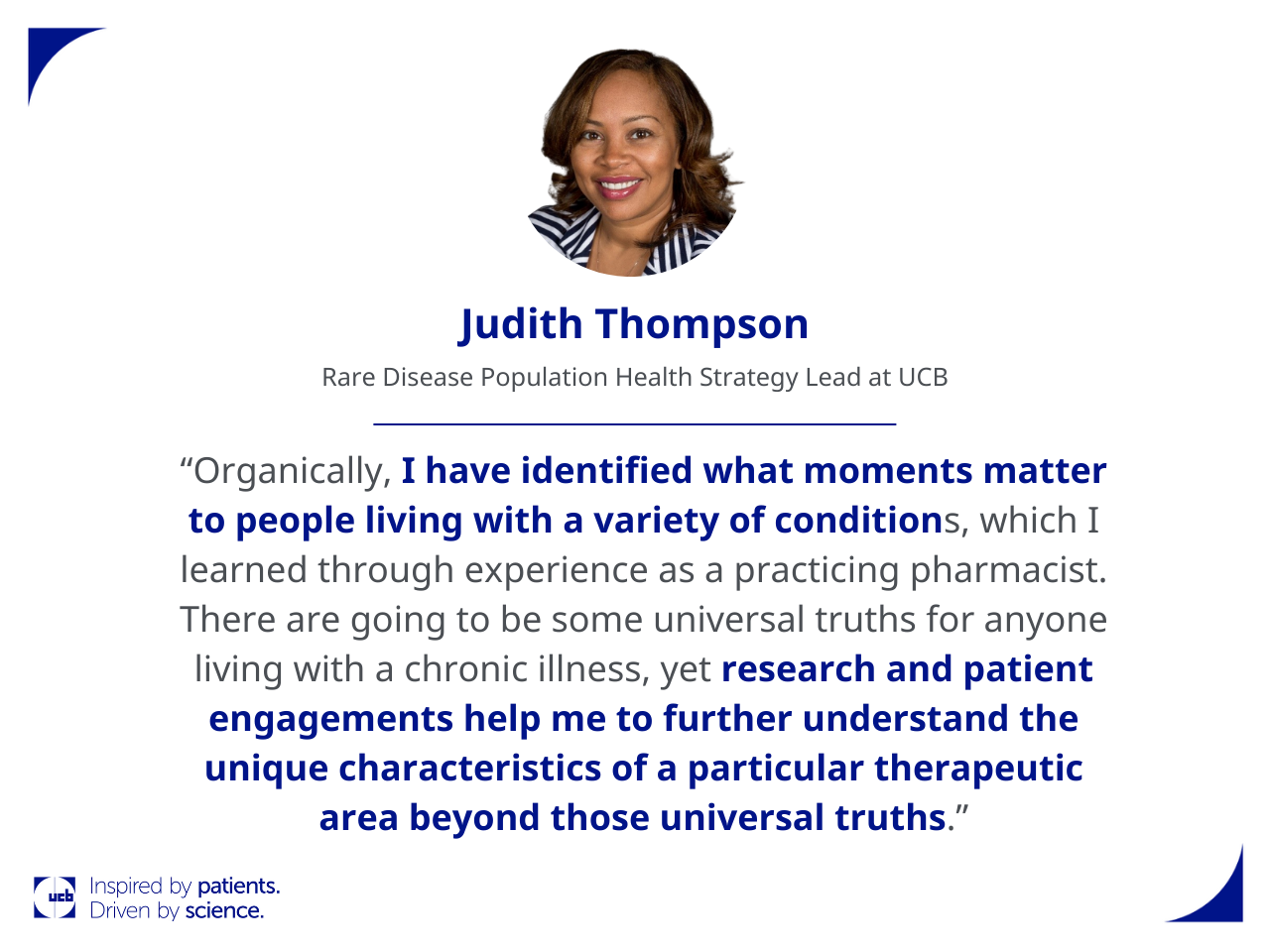
When we think about our purpose, people, and science – our people are a core component of how we deliver moments that matter for people living with severe diseases. At UCB, our people bring their whole selves to work enriching our environment with unique perspectives and experiences. How our people engage with each other and with society beyond UCB makes them better colleagues and employees. We’re pleased to spotlight some of our incredible employees.
--
Judith Thompson, Rare Disease Population Health Strategy Lead, has worked at UCB for nine years. However, she did not know she would eventually find herself in her current role following her work as a community and clinical pharmacist. Before population health was the buzz phrase it is now, she wanted to educate her patients individually on lifestyle and behavioral modifications and all the things that are now considered social determinants of health. What she quickly realized was that the healthcare provider that she aspired to be did not match the traditional healthcare delivery system. Judith wanted to continue bringing value to patients. Hence, she decided to leave her old practice and look for something more fulfilling to provide the value and quality interactions she desired. When a temp agency reached out to Judith, she took the role of a medical information contractor and soon realized UCB could give her the opportunities she was looking for.
In continuing her journey within UCB, she held various roles in Medical Affairs prior to joining the inaugural team created to focus on Population Health in epilepsy. Judith came to pharma wanting to have a larger impact, and she realized Population Health would allow her to create the type of impact she desired in one-on-one community level engagements by developing programs to solve prevalent issues and bring value to many. Her five-year journey as a Population Health Partner eventually led her to a senior position and to her current role as Rare Disease Population Health Strategy Lead.
“Organically, I have identified what moments matter to people living with a variety of conditions, which I learned through experience as a practicing pharmacist. There are going to be some universal truths for anyone living with a chronic illness, yet research and patient engagements help me to further understand the unique characteristics of a particular therapeutic area beyond those universal truths,” says Judith Thompson.
Judith’s team focuses on engaging with healthcare providers, advocacy groups, and other community stakeholders to share data and understand if the data resonates with the population that they're caring for, then discover if there is an opportunity to partner to solve or address some of the disparities the data revealed. Internally, her team is responsible for socializing research findings and identifying opportunities to weave Population Health constructs into our strategy.
Population Health involves identifying the disparities in health outcomes of a given population and identifying the factors that are contributing to those disparities, and creating programs and interventions that can address the disparities to promote health equity and improved health outcomes. It helps to understand if any factors contribute to a delayed diagnosis, misdiagnoses, delayed treatment, or suboptimal treatment. Some people with rare diseases wait years to achieve an accurate diagnosis, while others get diagnosed within months; this is a huge disparity. Judith aims to discover contributing factors to this and other disparities and seek community engagement to address prevalent issues, likely creating programs that are nationally scaled, such as her program Exploring Epilepsy. This program aims to educate those living with and caring for people with epilepsy so they can activate their self-advocacy, articulate their treatment goals, and feel empowered to have discussions with providers that impact their care journey.
To learn more about Population Health at UCB in the U.S., click here.
Choose Country
- Global Site – English
- Australia – English
- België – Engels
- Belgique – Anglais
- Brasil – Português
- България – Български
- Canada – English
- Canada – Français
- 中国 – 中文
- Česká Republika – Angličtina
- Danmark – Engelsk
- Deutschland – Deutsch
- France – Français
- España – Español
- Ελλάδα – Ελληνικά
- India – English
- Ireland – English
- Italia – Inglese
- 日本 – 日本語
- Казахстан – ағылшын тілі
- 한국 – 한국어
- Luxembourg – Anglais
- Luxemburg – Engels
- Magyarország – Angol
- México & Latinoamérica – Español
- Nederland – Engels
- New Zeeland – English
- Norge – Engelsk
- Österreich – Deutsch
- Polska – Polski
- Portugal – Inglês
- România – Engleză
- Россия – Русский
- Slovensko – Anglický
- Suomi – Englanti
- Sverige – Engelska
- Schweiz – Deutsch
- Suisse – Français
- Türkiye – Türkçe
- Україна – Англійська
- United Kingdom – English
- U.S.A. – English


